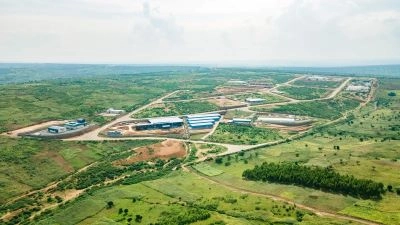
*Note: Name, Email and Phone Number are mandatory.

Invest in Chips & Biscuits Manufacturing Business in Africa
Is your next billion-dollar investment hiding in a place most investors haven’t even looked yet?
The global snack economy—projected to reach a value of USD 1,759.22 billion by 2028—is ripe for disruption, but the most powerful shifts aren’t happening in the usual places. While traditional snack giants contend with stagnation, Africa is stepping onto the global stage with surprising momentum. With its untapped market potential, rich agricultural base and a rising generation of urban consumers, Africa's chip and biscuits manufacturing business appeal is poised not just to join the global snack economy—but to rewrite its rules.
Globally, the potato chips market is expected to top USD 70 billion by 2030, growing at a steady 4.2% CAGR (TechSci Research). The biscuit market, already valued at USD 125 billion in 2024, is pacing similarly with a 4.7% growth rate (IMARC Group). But these numbers mask deeper tensions. Supply chain disruptions, inflationary input costs, and regulatory friction are squeezing margins in markets once seen as snack industry strongholds. Investors are now scouting for fresher soil—and Africa’s profile is rising fast.
Unlike these saturated landscapes, Africa’s snack food segment is gaining traction fast. The continent’s snack market is set to surpass USD 12 billion by 2030, growing at an impressive 7% annually (Statista). In markets like Nigeria, where domestic snack production meets less than 20% of demand, the opportunity to build, scale and lead is wide open. With strategic investment in local manufacturing, regional branding, and export pipelines, Africa isn’t just ready for growth—it’s primed for leadership.
What elevates Africa’s snack potential beyond just demand is its foundational advantage—raw material availability. The chips and biscuits industry relies heavily on ingredients like potatoes, cassava, wheat, maize, sugar and vegetable oils—all of which are widely cultivated across the continent.
Africa's raw material abundance is not just about quantity—it’s about strategic supply. With short farm-to-factory distances and rapidly expanding agri-processing capacity, snack production becomes more viable, scalable, and cost-effective. Countries like Nigeria, Egypt and Ethiopia are doubling down on agri-industrial strategies that favor downstream manufacturing, making it easier for investors to secure steady input supply.
Here’s a snapshot of Africa’s key crop strength for snack production:

| Raw Material | Top Producing Countries | Annual Output (Approx.) | Key Snack Application |
|---|---|---|---|
| Potatoes | Egypt, South Africa | ~8.7 M MT total | Chips, crisps |
| Cassava | Nigeria, Ghana | ~58M MT metric tons (> 60 M MT from Nigeria alone; Ghana ~18 M MT) | Cassava chips, starch base |
| Wheat | Ethiopia, Morocco, Tunisia | Growing capacity | Biscuits, crackers |
| Maize | Kenya, Zambia, SA | ~80M MT (SSA total) | Corn snacks, flour blends |
| Sugarcane | Sudan, South Africa, Egypt | ~35 M MT combined | Sweet biscuits, glazes |
| Vegetable Oil | Multiple | Locally refined | Frying, shortening |
Africa is also projected to witness a 574% increase in snack food trade by 2030, underscoring its dual role as a producer and exporter. This raw material proximity is more than a cost advantage—it’s a strategic asset that reduces dependency on imports, shortens supply chains, and strengthens operational control. The presence of locally grown crops also means food processors can adapt to rising consumer preferences for locally sourced and minimally processed ingredients, a trend increasingly dominant in urban African markets.
Africa’s chips and biscuits market is moving toward full value chain integration, with production, processing, packaging, and distribution becoming increasingly localized. This shift is powered by agro-industrial parks, special economic zones, and public-private partnerships that provide essential infrastructure and incentives for end-to-end manufacturing within national borders.
Countries like Ghana and Kenya are establishing food processing hubs that connect rural producers to urban markets. Meanwhile, ARISE IIP develops vertically integrated industrial ecosystems offering plug-and-play factories and direct access to major logistics corridors, enabling efficient delivery to local and export markets. Investors have a unique opportunity to help build this emerging system rather than just purchase its output.
Despite promising prospects, some challenges persist: inconsistent power supply, logistics bottlenecks, regulatory uncertainties, and competition from cheaper imports can affect local manufacturers. However, governments are actively improving the business environment, and the African Continental Free Trade Area (AfCFTA) is easing cross-border trade by reducing tariffs and harmonizing policies.
Crucially, Africa’s close proximity to raw materials and rising local demand provide a strong competitive advantage against imports. This combination of factors gives investors confidence that potential risks are being managed, paving the way for sustainable growth.
With more than 60% of its population under the age of 25 and rapid urbanization driving lifestyle shifts, Africa’s snack appetite is growing by the day. As cities expand and incomes rise, consumers are reaching for affordable indulgences—like potato chips and biscuits—that offer convenience, taste, and familiarity.
Studies show a direct correlation between snack consumption and urban, middle-class expansion. The number of middle-income households in Africa is projected to rise to over 40 million by 2030, with countries like Nigeria, Kenya, and South Africa leading the curve. These consumers are increasingly influenced by social trends, global food culture, and domestic product innovations, creating fertile ground for branded, packaged snack foods.
According to a report by McKinsey, packaged food consumption in Africa is expected to double by 2030. Snack brands that align with emerging preferences for health-conscious, locally sourced, and affordably packaged products are likely to see exponential growth.
Africa is not just a consumer market—it’s an emerging export base for processed snack foods. The implementation of the African Continental Free Trade Area (AfCFTA) unlocks access to a 1.4 billion person market with reduced tariffs and streamlined trade policies. This positions Africa as a powerful regional production center for chips and biscuits.
Export-oriented manufacturing can especially benefit from Africa’s proximity to Europe, the Middle East, and South Asia, as well as growing trade ties with ASEAN markets. By leveraging SEZs and export incentives in countries like Togo, Benin, and Rwanda, companies can achieve both cost advantages and regulatory ease while building globally competitive brands.
The growing interest from multinational FMCG firms, as seen in recent facility expansions by companies like Kellogg’s and Mondelez in West and East Africa, reflects the long-term viability of the region.

Africa’s snack revolution is not a mirage—it’s a momentum play for visionary investors. With raw materials in abundance, a rapidly growing consumer base and supportive trade frameworks, the continent presents a rare opportunity to enter early and scale efficiently.
Investment in local production facilities, co-packing units, storage infrastructure, and distribution logistics offers the potential for strong returns, particularly for those with a long-term vision and the ability to scale across growing regional markets. Furthermore, participation in food innovation—through healthier formulations, cassava-based biscuits, or regional flavor adaptations—can create strong brand loyalty and category leadership.
Whether you’re a food manufacturer looking to diversify production, an investor eyeing high-growth verticals, or a brand seeking to localize sourcing, Africa’s chips and biscuits industry is ready—and ripe—for strategic bets.
The global snack narrative is quietly being rewritten. Africa, once considered only a market for imported goods, is now reshaping itself as a hub for production, innovation, and regional dominance. Investors willing to go beyond the obvious are finding not only margins—but meaningful impact.
Africa’s snack revolution is unfolding now—early movers will capture the biggest slices. The question is: will you lead the way or watch from the sidelines?
Explore unparalleled investment opportunities in Africa’s burgeoning chips and biscuits sector at Africa for Investors. Discover ready-to-operate factories, access to abundant raw materials, and duty-free export benefits under the African Continental Free Trade Area (AfCFTA). Don't miss your chance to be part of the next global snacking revolution.
Why invest in chips and biscuits in Africa?
Africa offers low-cost raw materials, a fast-growing young population, favorable trade agreements, and government-supported industrial platforms like ARISE IIP, which reduce investment risks and costs.
Is demand for snack foods really growing in Africa?
Yes. Africa’s snack food market is expected to exceed USD 12 billion by 2030. Additionally, trade in this category is projected to grow by over 574% by the end of the decade.
What about challenges like power and logistics?
Industrial platforms like ARISE IIP eliminate these barriers by offering reliable utilities, port proximity, and customs facilitation. These zones are designed for international-grade operations.
Which regions in Africa are best for investment?
Benin (GDIZ), Togo (PIA), and Gabon (GSEZ) lead the charge with dedicated food processing infrastructure. Kenya, Nigeria, South Africa, and Ghana also show strong domestic demand and export readiness.
How do I begin the investment process?
Start by connecting with ARISE IIP or visiting AfricaForInvestors.com. They will help assess your needs and match you to the right zone, partners, and opportunities.
Which areas in the value chain should I focus on?
From raw input sourcing (cassava, maize, wheat) to processing, packaging, and logistics—each layer offers investment opportunities. High-margin areas include health-focused biscuits and sustainable chip lines.
#InvestInAfricaNow
Choose the best investment opportunities and set up your business in Africa's world class industrial zones today, securing a prominent position in the global market.
Get in touch with our Africa investment specialists or support team and expand your business in Africa today!
recommended topics

Discover prime locations across Africa for lucrative investment opportunities and strategic growth.

Explore key investment zones in Africa that offer strategic advantages and economic benefits.

Uncover the best investment opportunities in Africa to maximize your business potential.

Identify the most promising sectors in Africa for high returns and sustainable investments.
Compare
Dear investor, please compare similar category items- either Locations or Opportunities.
*Already subscribed.
*Enter your name/email.

Sign up for exclusive investment alerts.
Already subscribed? Skip
Thank You For Subscribing to
Africa For Investors.

You will be redirected to AFI’s Linkedin Profile in 10 seconds.
Stay On AFI Website